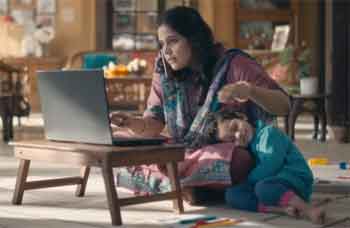– Dr.Sagar Sharma –
Spread of corona virus infections among children has been a major concern. While there is some talk of the third wave and its resultant impact on kids, we won’t have any reasons to worry if suitable health protocols are followed along with timely vaccinations.
It’s a fact that fewer children have contracted Covid-19 as compared to adults. However, children who are infected can spread the virus to adults quite easily. Most kids infected by coronavirus have mild or no symptoms. In some cases, they may require hospitalisation and intensive care.Children with underlying medical conditions are more likely to contract the virus.
Some of the underlying conditions include asthma or other chronic lung diseases, diabetes, sickle cell anaemia, heart disease since birth, immunosuppression or any adverse metabolic conditions or obesity.If the kid has any such underlying condition, the doctor has to be immediately informed. Suitable action can then be taken at the earliest and the doctor can chart the necessary course of treatment. It is important to flag any such concerns soon after the child contracts coronavirus, without delay.
Symptoms of coronavirus among children
Covid-19 symptoms are similar in children and adults. They will resemble any other common illnesses like cold, throat irritation or any other form of allergy. For kids, the most common symptoms of COVID-19 are fever and cough. They may also get chills or nasal congestion. Just like some adults they may also suffer from loss of taste or smell. Diarrhoea may be another symptom. One has to also watch out for stomach ache, tiredness, body ache etc. For babies who are under one year of age, poor appetite may show up as a symptom.
Monitoring children during the pandemic
It is important to monitor the child for the various possible COVID-19 symptoms. Body temperature of the kid has to be checked periodically. It’s advised to check whether the temperature is above 100.4 degree F. Check if the child has a sore throat and alsocheck for uncontrolled cough. Look for any difficulty in breathing. For kids who suffer from asthmatic cough, verify if there is a change from their usual coughing pattern. Check if there vomiting sensation or severe headache accompanied by high fever.
Seek emergency medical care for the child, if there are warning signs. Especially if the child appears confused, has trouble breathing, has pain in the chest for long periods of time. Pale or blue-coloured skin, lips or nails are additional signals.
Preventive measures
All the members of the family should get vaccinated for Covid-19. This will greatly reduce the chances of children getting infected. If an infected person is in close contact with the child, by day 4 or 5, the child will also show symptoms. So, it is important to isolate the infected person. Make sure that surfaces frequently touched upon by children are disinfected. The floor of the house should be kept clean. Door handles need special attention.
Children should be able to understand the instructions given by parents. Explain to them in the detail about the importance of following a certain health protocol. They may not realise this immediately and that’s where good, consistent communication plays a role. Children should use hand sanitisers frequently, use masks whenever required and talk with others by keeping a distance of at least six feet. Also, try to avoid any contact with infected people.
Medical condition called MIS-C
Multisystem Inflammatory Syndrome in Children (MIS-C) is a medical condition associated with Covid-19 in children. MIS-C is a rare, but dangerous condition that can occur after the COVID-19 infection. It is an inflammatory reaction in the body which typically develops about four weeks after the coronavirus infection. The symptoms include fever, rashes, red eyes, diarrhoea and vomiting. The inflammation can then affect the heart, blood vessels and other organs, leading to a complicated situation.
MIS-C is a treatable condition. Most children recover fully from the disease. The inflammation can be controlled with the help of medicines. Lasting organ damage can also be prevented with timely medical intervention.
Covid-19 Vaccination
Vaccinations are regarded as the first line of defence against diseases. It’s important to follow the vaccine schedule as far as children are concerned. An infant gets some passive immunity from the mother after birth. However, the immunity wears off during the child’s first year.
Covid-19 vaccination of children in 12-18 age group is in phase 3 trials. By the end of this year it is most likely to be made available for children. It is our responsibility to ensure that our children are vaccinated against this deadly virus. Hence, care has to be taken to ensure that the children are vaccinated as soon as it is made available.
About the Author
Dr.Sagar Sharma
Author & Consultant
Dr.Sagar Sharma,Consultant – Pediatrician and Neonatologist, Columbia Asia Hospital SarjapurRoad (A unit of Manipal Hospitals)
Disclaimer : The views expressed by the author in this feature are entirely her / his own and do not necessarily reflect the views of INVC NEWS.













